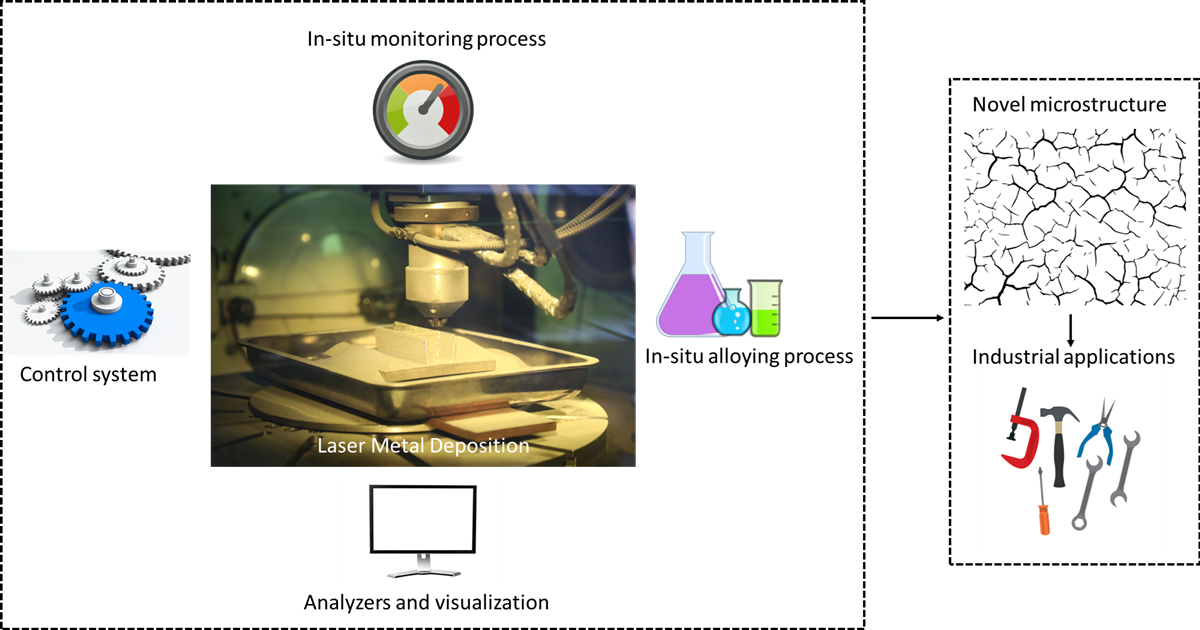- 2.5Impact Factor
- 5.5CiteScore
- 20 daysTime to First Decision
Laser Metal Deposition Process in Advanced Manufacturing
This special issue belongs to the section “Mechanical Engineering“.
Special Issue Information
Dear Colleagues,
Laser metal deposition (LMD) is an additive manufacturing-based process and is classified under the direct energy deposition/direct metal deposition technique. It is one of the most used metal additive manufacturing processes, and it is capable of manufacturing complex components. It is also used for the repair of damaged components, refurbishment of high-valued components for improved life spans, and re-engineering of existing components with protective coatings. It uses a laser energy source, metal powder, and incorporates a method of layered production to build a metal component from a design data file. The quality and repeatability of the produced LMD component and coating depend not only on the process parameters and powder properties but on the thermal history.
This Special Issue will be focused on generating the LMD process maps and process signatures to avoid defects and instability, and also to produce a high level of quality and repeatability for highly complex components and industrial applications. To achieve this, add-on tools for process monitoring and enabling (as in heating stages) are required.
Areas that will be discussed in this Special Issue will focus on the in situ alloying, in situ melt pool monitoring, in situ temperature monitoring, heating processes (occurs due to/during the manufacturing process), ex situ characterization, novel materials, metal matrix composites, aluminide alloys, shape‒memory alloys, biomedical materials, product improvement through use of LMD, and industry participation works through refurbishment.
Dr. Bathusile N. Masina
Prof. Dr. Abimbola Patricia Idowu Popoola
Guest Editors
Manuscript Submission Information
Manuscripts should be submitted online at www.mdpi.com by registering and logging in to this website. Once you are registered, click here to go to the submission form. Manuscripts can be submitted until the deadline. All submissions that pass pre-check are peer-reviewed. Accepted papers will be published continuously in the journal (as soon as accepted) and will be listed together on the special issue website. Research articles, review articles as well as short communications are invited. For planned papers, a title and short abstract (about 250 words) can be sent to the Editorial Office for assessment.
Submitted manuscripts should not have been published previously, nor be under consideration for publication elsewhere (except conference proceedings papers). All manuscripts are thoroughly refereed through a single-blind peer-review process. A guide for authors and other relevant information for submission of manuscripts is available on the Instructions for Authors page. Applied Sciences is an international peer-reviewed open access semimonthly journal published by MDPI.
Please visit the Instructions for Authors page before submitting a manuscript. The Article Processing Charge (APC) for publication in this open access journal is 2400 CHF (Swiss Francs). Submitted papers should be well formatted and use good English. Authors may use MDPI's English editing service prior to publication or during author revisions.
Keywords
- in situ alloying
- in situ melt pool monitoring
- in situ temperature monitoring
- heating processes
- metal matrix composites
- shape‒memory alloys
- biomedical materials
- aluminide alloys
- refurbishment
- LMD application in industry

Benefits of Publishing in a Special Issue
- Ease of navigation: Grouping papers by topic helps scholars navigate broad scope journals more efficiently.
- Greater discoverability: Special Issues support the reach and impact of scientific research. Articles in Special Issues are more discoverable and cited more frequently.
- Expansion of research network: Special Issues facilitate connections among authors, fostering scientific collaborations.
- External promotion: Articles in Special Issues are often promoted through the journal's social media, increasing their visibility.
- e-Book format: Special Issues with more than 10 articles can be published as dedicated e-books, ensuring wide and rapid dissemination.

